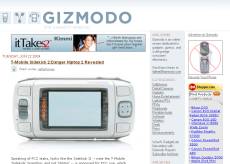
1. I feel that I am being assigned this reading because William Gibson, the author of
Neuromancer, possesses the unique ability to describe the surroundings with great eloquence and detail. His writing style allows the reader to feel as if he/she is truly inside the book. And because
Neuromancer invites the reader to step into a very alien world filled with unfamiliar jargon, this sense of immersion is crucial to the enjoyment of such a story.
2. The existence of the science fiction genre allows the reader to step into a fantasy world that possesses some origin or influence from the actual history of the world as we know it, and puts a massive spin on every element within that fictional story. To make things clearer, lets take a brief look at
Star Wars, a story about good versus evil that involves humans, weapons, and space. These entities found in
Star Wars can also be found in real life with one common difference: their characteristics have been altered and exaggerated--humans have supernatural powers, the weapons are not projectile but rather energy based, and the story does not take place anywhere near Earth but rather in a "galaxy, far, far away."
Neuromancer is an example of science fiction because it takes elements that we see in our everyday lives, such as the common references to company names like Sanyo, Sony, Toyota, and Mitsubishi and incorporates it into the actual story. Real-life cities such as New York and Atlanta are each portrayed as a metropolis filled with vast technology.
3. The science fiction genre influences our daily lives because it allows inventors to conjure up an actual products that were once only found in imagination. Even with our use of language and attitude towards technology, popular culture has been impacted by science ficiton in many subtle ways that are not readily apparent. Take a look at palm pilots and cellphones, two commonly used pieces of technology that were first seen on the cult classic
Star Trek. Even in
Neuromancer, the term "microsoft" was used to label a small black chip that held information; little did Gibson know that two decades later, Microsoft is one of the most prominent technological corporations in the world. And that the term "cyberspace" (as first seen in
Neuromancer) can now be found in America On-Line's advertisements.
4. Case can be considered a "hero" because although he was a computer hacker who stole data, he is using these skills for the sake of the good. For example, he linked with Molly and helped break into Sense/Net's computer in order for them to steal the Dixie Flatline's construct; a character who was murdered but whose thoughts were saved to a computer chip of sorts. The evil that he opposes is simply the society around him e.g. the large corporation Sense/Net that is very dominant in technology who tried to stop him.
5.
6. Cyberspace - can be described as a large construct of virtual reality (at least in the Gibson world)
Matrix - the data network that links all of Gibson's "cyberspace" together
ICE - Intrusion Countermeasures Electronics; a security defense that protects crucial, valuable data from intruding viruses (such as the "Mole" in the story)
simstim - a technology that allows for one person to simulate a telepathic link to the stimulus of another person
coffins - a cheap man's motel where you pay and sleep in a coffin
virus - a program that has the intension of sneaking onto a system to cause harm
zaibatsu - a large Japanese conglomerate that possessed alot of political power and control in Gibson's world
meat - the "human" that was within the artificial exterior shell
microsoft - a little chip that can be inserted into one's head that contains a plethora of database information
artificial intelligence - the act of programming a computer to mimic that of a human brain
subliminals -
puppets -
7. Seeing as how this novel was written 25 years ago, it is very prophetic because the world we live in today is quite similar to the one described in the story. For example, people are now starting to have chips embedded into their skin. Case's pancreas had to be replaced and they patched it up with technology. Our real world is coming close to achieving such magic as seen with stem-cell research. The existence of a cyberspace where residents within Gibson's world were able to escape into can be found in today's video games where thousands of players join the same world and compete with/against each other. And I do believe it is cynical in a sense that the technology can be abused, no matter if it is 1984 or 2004. Take a look at all of the electronic credit card thefts that exist today. Now take a look at
Neuromancer when Case had to trick the cameras within Sense/Net in order to bypass and fool security.





